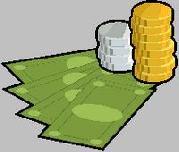
 |
|
| Financial Terms | |
| World Trade Organization (WTO) |
|
Information about financial, finance, business, accounting, payroll, inventory, investment, money, inventory control, stock trading, financial advisor, tax advisor, credit.
Main Page: inventory, finance, business, tax advisor, credit, stock trading, accounting, financial advisor, |
Definition of World Trade Organization (WTO)
World Trade Organization (WTO)the arbiter of global trade that was created in 1995 under the General Agreement on Tariffs and trade; each signatory country has one
Related Terms:Balance of tradeNet flow of goods (exports minus imports) between countries. Basket tradesRelated: Program trades. Block tradeA large trading order, defined on the New York Stock Exchange as an order that consists of Counter tradeThe exchange of goods for other goods rather than for cash; barter. Flat trades1) A bond in default trades flat; that is, the price quoted covers both principal and unpaid, Floor traderA member who generally trades only for his own account, for an account controlled by him or Forward tradeA transaction in which the settlement will occur on a specified date in the future at a price  Informationless tradestrades that are the result of either a reallocation of wealth or an implementation of an Information-motivated tradestrades in which an investor believes he or she possesses pertinent International Bank for Reconstruction and Development - IBRD or World BankInternational Bank for Reconstruction and Development makes loans at nearly conventional terms to countries for projects of high OPEC (Organization of Petroleum Exporting Countries)A cartel of oil-producing countries. Plan for reorganizationA plan for reorganizing a firm during the Chapter 11 bankruptcy process. Posttrade benchmarksPrices after the decision to trade. Pre-trade benchmarksPrices occurring before or at the decision to trade. Program tradesAlso called basket trades, orders requiring the execution of trades in a large number of Publicly traded assetsAssets that can be traded in a public market, such as the stock market. Registered traderA member of the exchange who executes frequent trades for his or her own account. ReorganizationCreating a plan to restructure a debtor's business and restore its financial health. Reversing tradeEntering the opposite side of a currently held futures position to close out the position. Society for Worldwide Interbank Financial Telecommunications (SWIFT)A dedicated computer network to support funds transfer messages internationally between over 900 member banks worldwide. Spot tradeThe purchase and sale of a foreign currency, commodity, or other item for immediate delivery. Terms of tradeThe weighted average of a nation's export prices relative to its import prices. Thinly tradedInfrequently traded. TradeA verbal (or electronic) transaction involving one party buying a security from another party. Once a Trade acceptanceWritten demand that has been accepted by an industrial company to pay a given sum at a future date. Trade creditCredit granted by a firm to another firm for the purchase of goods or services. Trade dateIn an interest rate swap, the date that the counterparties commit to the swap. Also, the date on Trade debtAccounts payable. Trade draftA draft addressed to a commercial enterprise. See:draft. Trade on top oftrade at a narrow or no spread in basis points relative to some other bond yield, usually Trade houseA firm which deals in actual commodities. TradersPersons who take positions in securities and their derivatives with the objective of making profits. Uptick tradeRelated:Tick-test rules World BankA multilateral development finance agency created by the 1944 Bretton Woods, New World investiblewealth The part of world wealth that is traded and is therefore accessible to investors. network organizationa flexible organization structure that North American Free Trade Agreement (NAFTA)an agreement among Canada, Mexico, and the United States establishing the North American Free trade Zone, with a resulting reduction in trade barriers organizational culturethe set of basic assumptions about organizational-level costa cost incurred to support the ongoing organizational structurethe manner in which authority and organization charta depiction of the functions, divisions, organizational forman entity’s legal nature (for example, reorganizationRestructuring of financial claims on failing firm to allow it to keep operating. trade-off theoryDebt levels are chosen to balance interest tax shields against the costs of financial distress. Balance of Merchandise TradeThe difference between exports and imports of goods. Balance of TradeSee balance of merchandise trade. Free TradeThe absence of any government restrictions, such as tariffs or quotas, on imports or exports. Terms of TradeThe quantity of imports that can be obtained for a unit of exports, measured by the ratio of an export price index to an import price index. Trade DeficitDeficit on the balance of merchandise trade. World BankThe International Bank for Reconstruction and Development, an international organization that provides long-term loans to developing countries to improve their infrastructure. Trade LoadingA term used for channel stuffing in the domestic tobacco industry. Related to : financial, finance, business, accounting, payroll, inventory, investment, money, inventory control, stock trading, financial advisor, tax advisor, credit. |